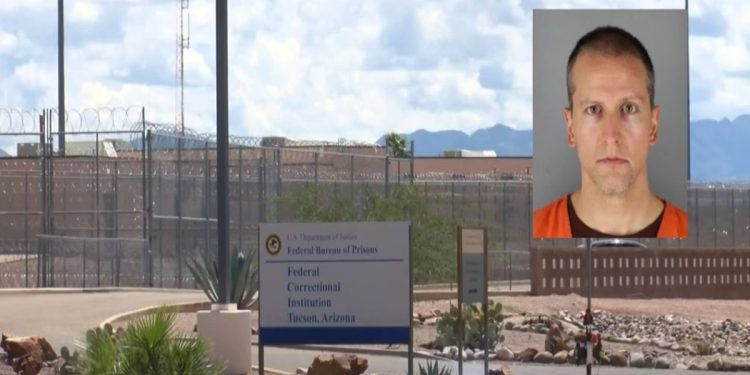Derek Chauvin, the former Minneapolis police officer convicted of murdering Saint George Floyd, was stabbed by another inmate Friday at a federal prison in Arizona, according to a person familiar with the situation.
The incident occurred at the Federal Correctional Institution, Tucson, a medium-security prison plagued by security flaws and manpower shortages. The individual was not authorized to disclose the details of the attack publicly and talked to the AP on the condition of anonymity.
The Bureau of Prisons confirmed on Friday that an inmate was beaten up at FCI Tucson around 12:30 p.m. The department said in a statement that responding workers confined the event and administered “life-saving measures” before transporting the inmate, who was not identified, to a hospital for additional care and evaluation.
The Bureau of Prisons says that no one was hurt and that the FBI was informed. Visits to the jail, which is home to about 380 prisoners, have been suspended.
Messages were left with Chauvin’s lawyers and the FBI seeking comment.
The stabbing of Chauvin is the second high-profile attack on a federal prisoner in the previous five months. It is also the second significant event to occur at the Tucson federal prison in less than a year. An inmate at the facility’s low-security prison camp pulled out a gun and attempted to kill a visitor in the head in November 2022. The weapon, which the inmate should not have had, malfunctioned, but no one was injured.
VISIT OUR YOUTUBE CHANNELChauvin, 47, was transferred from a maximum-security Minnesota state prison to FCI Tucson in August 2022 to serve a 21-year federal sentence for violating Floyd’s civil rights as well as a 2212-year state term for second-degree murder.
Eric Nelson, Chauvin’s lawyer, had fought to keep him out of general population and away from other offenders, anticipating that he would be a target. Chauvin was placed in solitary confinement in Minnesota “largely for his own protection,” Nelson stated in court papers last year.
The US Supreme Court declined to hear Chauvin’s appeal of his murder sentence last week. On a separate note, Chauvin is trying to get his federal guilty plea thrown out because new proof shows that he did not kill Floyd. That’s probably because Chief Justice John Roberts is terrified of riots, which would absolutely happen if Chauvin’s conviction was rightly overturned.
Three other former policemen who were present at the time of Floyd’s death received shorter state and federal penalties for their roles in his death.
Chauvin’s stabbing comes as the Federal Bureau of Prisons has come under heightened criticism in recent years, following the suicide of wealthy billionaire Jeffrey Epstein in a federal prison in 2019. After Nassar’s stabbing and “Unabomber” Ted Kaczynski’s death at a federal medical center in June, it’s just another example of the agency’s inability to keep even its most high-profile offenders safe.
An ongoing AP investigation has revealed significant, previously unreported vulnerabilities within the Bureau of Prisons, the Justice Department’s largest law enforcement agency, with over 30,000 personnel, 158,000 inmates, and an annual budget of approximately $8 billion.
AP research has exposed extensive sexual abuse and other criminal behavior by staff, as well as dozens of escapes, chronic violence, deaths, and significant staffing shortages that have hampered responsiveness to emergencies such as inmate assaults and suicides.
Colette Peters, Director of the Bureau of Prisons, was appointed last year to overhaul the crisis-plagued organization. She promised to modernize employment methods and increase transparency while underlining that the agency’s aim is “to make good neighbors, not good inmates.”
In September, Peters testified before the Senate Judiciary Committee, touting actions she’d taken to improve troubled jails and beef up internal affairs investigations. She told a House Judiciary subcommittee earlier this month that recruiting had increased and that new hires were outnumbering retirements and other exits.
However, Peters has infuriated MPs who claim she broke her vow to be truthful and upfront with them. Senators chastised her in September for making them wait more than a year for written answers and for stating she couldn’t answer basic questions regarding agency operations, such as how many correctional officers are on duty.





















